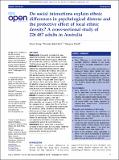Do social interactions explain ethnic differences in psychological distress and the protective effect of local ethnic density? A cross-sectional study of 226 487 adults in Australia
Abstract
Background: A frequently proposed, but under-researched hypothesis is that ethnic density benefits mental health through increasing social interactions. We examined this hypothesis in 226 487 adults from 19 ethnic groups aged 45 years and older in Australia. Methods: Multilevel logit regression was used to measure the association between ethnicity, social interactions, own-group ethnic density and scores of 22+ on the Kessler scale of psychological distress. Self-reported ancestry was used as a proxy for ethnicity. Measures of social interactions included a number of times in the past week were (i) spent with friends or family participants did not live with; (ii) talked to someone on the telephone; (iii) attended meetings of social groups and (iv) how many people could be relied upon outside their home, but within 1 h of travel. Per cent own-group ethnic density was measured at the Census Collection District scale. Results: Psychological distress was reported by 11% of Australians born in Australia. The risk of experiencing psychological distress varied among ethnic minorities and by country of birth (eg, 33% for the Lebanese born in Lebanon and 4% for the Swiss born in Switzerland). These differences remained after full adjustment. Social interactions varied between ethnic groups and were associated with lower psychological distress and ethnic density. Ethnic density was associated with reduced psychological distress for some groups. This association, however, was explained by individual and neighbourhood characteristics and not by social interactions. Conclusions: Social interactions are important correlates of mental health, but fully explain neither the ethnic differences in psychological distress nor the protective effect of own-group density.
Citation
Feng , X , Astell-Burt , T & Kolt , G S 2013 , ' Do social interactions explain ethnic differences in psychological distress and the protective effect of local ethnic density? A cross-sectional study of 226 487 adults in Australia ' , BMJ Open , vol. 3 , no. 5 , 002713 . https://doi.org/10.1136/bmjopen-2013-002713
Publication
BMJ Open
Status
Peer reviewed
ISSN
2044-6055Type
Journal article
Collections
Items in the St Andrews Research Repository are protected by copyright, with all rights reserved, unless otherwise indicated.

